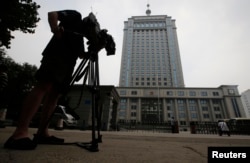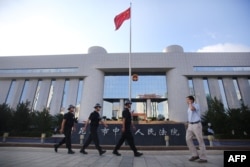China has drawn international criticism over a crackdown on human rights lawyers this year, and there are reports that authorities may be planning even broader restrictions over the legal profession.
Remin University law professor Chen Weidong, who has helped draft legislation including amendments to China’s criminal law, said authorities may soon launch a mechanism to grade lawyers, allowing local justice bureaus to rank lawyers by seniority and restrict key cases to those of a certain level in higher courts, Chinese media reported.
Chen told a symposium in Guangzhou over the weekend that “lawyers would need specific qualifications to take on various types of cases, such as death penalty cases.”
There are still few details about the plan, including how the mechanism would work and whether the grading body would have any independence. But it is already raising concerns over the possible abuse of power.
Tool to silence outspoken lawyers?
Rights lawyer Chen Jiangang argued that such a mechanism will only end up as a tool empowering authorities to further silence opponents and outspoken lawyers, many of whom have been arrested or detained for doing nothing but their job.
“Some lawyers have been put behind bars while others [like me] may be further excluded from their practice of law [under the new proposal]. That is to say, it will be a system under which all human rights lawyers will be completely wiped out,” Chen said.
Chen, who had represented anti-corruption activists including New Citizen’s Movement member Zhang Baocheng, said he already has a hard time finding much work because the police constantly deny him access to his clients or threaten to put him behind bars.
He said the overall situation with his legal profession shows how the advancement of civil rights in China has foundered.
“There’s never been a check and balance of power here in China. Authorities have long been acting arbitrarily, which has resulted in a widespread miscarriage of justice,” the lawyer added.
Not all lawyers are as critical of the moves.
Li Xiaolin, secretary-general of the criminal litigation committee under the Beijing Bar Association, said that such a ranking system could be well-intended to discipline ill-performing and disqualified lawyers.
"It’s often seen that some inexperienced lawyers have taken up harsher cases than they can handle, trampling rights of their clients," he said.
Under such circumstances, a fair ranking system may be able to better guide litigants in hiring capable lawyers to defend for them, said Li, who had represented famous actress Liu Xiaoqing in her tax evasion case.
“I think an appropriate ranking system can be reasonable, but the design of the grading system matters greatly. Also, another thing is that, sometimes, even big shot lawyers may not do their job well,” Li said.
However Li disagreed that local justice bureaus should be involved in the ranking of lawyers. Instead, he said the opinions of legal professionals, including lawyers themselves, should be taken into consideration while such a system, in principle, should be in line with international practices, he said.
The problem is that there are few international precedents for such rankings of lawyers.
In Britain, for example, lawyers aren't ranked, although some of them are honored as barristers who specialize in courtroom advocacy and litigation, argued Zhang Qianfan, a constitutional law professor at Peking University.
“Personally, I oppose the ranking of lawyers because their performance is often evaluated by the industry itself. The abuse of power will be inevitable regardless who will be awarding ranks with what ranking standards,” the professor said.






